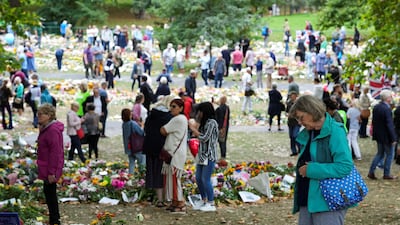Since last week, countless flowers for Queen Elizabeth have been placed across the UK, including at Buckingham Palace, Windsor and Sandringham, as well as Balmoral, where she died on September 8. Aerial photographs of the queen's royal residences show row after row of colours dotting peripheries of her estates and castles. Public spaces and parks too have been similarly festooned. The sight of so many bouquets is a manifestation of the sense of loss that Britons, and so many other people in the UK, have felt.
Naturally, the demand for florists is through the roof. One London branch of the high street retailer Marks and Spencer ran out of flowers. The poor manager is bending over backwards to find more.
One wholesale florist I spoke with in the Netherlands, who supplies to the UK and has been in the business for 22 years, says the last time he saw a comparable demand for flowers was in 2012, during the London Summer Olympics. Ahmad Al Mughrabi usually sends €10-15,000 ($15,000) worth of flowers per week to his four customers across the UK, who then supply to a string of florists and supermarket shops. In the week after the Queen's death, his business shot up to €65,000 ($65,000). Going by the size of his pre-orders for the funeral on September 19, Mr Al Mughrabi is anticipating revenue to "double that" by Monday. "For people who are buying flowers, price does not matter at this time," he says.
As is often the case, naysayers – whether non-monarchists, leftists, or plain cynics – have expressed dismay at the waste of resources. Some say that instead of the few pounds spent on a bouquet, homeless people could have been fed, or that the money could have been donated to charity.
While perfectly well-meaning, such sentiments are pragmatic to a fault; people do not have to choose. Academics would call it a false dichotomy. Flowers can be placed and good deeds can be done. If the added lever of UK's ever-rising cost of living must be brought in, the price of a few lilies, steeper than usual though it may be, can be evened out by mourners forgoing some other little indulgence of the month. People coming together in grief, using the prop of a flower, does not mean that they are against conserving resources or that they cannot also make a difference in "more meaningful ways".
For florists across the UK, it is an unexpected bump in business but they are accustomed to the rise and fall in demand for flowers, in keeping with holidays and the seasons. And this week has been anything but a lull. Across the country, more police officers have been deployed, according to the BBC, and Transport for London is estimating an extra one million people on the network to central London to pay their respects, a scale they say is greater than, again, the Olympics in 2012.
And then things will quiet down, Mr Al Mughrabi told me. Business prospects in the flower trade for the year 2023 don't look good, he says, considering the litany of political and environmental crises and related commodity prices in the world. The full impact of Brexit on the flower business (tulips tend to grow in Amsterdam) is another story.
Mr Al Mughrabi can't know just yet exactly how much his supplies of orchids, roses and seasonal blooms such as dahlias and hydrangeas to the UK will fall next year. For the moment though, it is a busy time. While it is also an economically difficult time in the UK – with inflation in August only slightly better than July's a 40-year high, or rather, increasing at a lesser rate – perhaps there is solace to be taken in that at least some businesses, such as the flower trade, are doing well, even if temporarily.
At such a consequential page turn in a chapter of history, buying or picking flowers from the garden or from the shop down the road to leave at designated spots, is a gesture that at its best can unite people. This could be seen in London on Sunday, at Green Park, when people who were gathered around the tributes for the Queen came together in an act of spontaneous community service. They set about to remove the plastic wrapping from bouquets, numbering by then in the hundreds, and disposed the cellophane paper, leaving the site that much nicer. Children pitched in, forming an efficient little chain to dispose plastic responsibly and prevent littering. It was glimpse of humanity among strangers, co-operating out of respect and a common need to improve a site of tribute.
Britons in their lifetimes are likely to know just the one queen, and possibly live through the death of just the one queen. Seen in that light, a child being guided by a watchful parent to place a few long stemmed gerberas at a spot has symbolic meaning. For the young and older, this forms a memory and the basis of a story likely to be retold over the years. Saying farewell with flowers is undeniable commercial fodder for the horticulture industry that is charging higher prices for a single yellow bud. But even so, the gesture of buying that flower, and navigating unrivalled queues to lay it down should not be seen as a waste.








